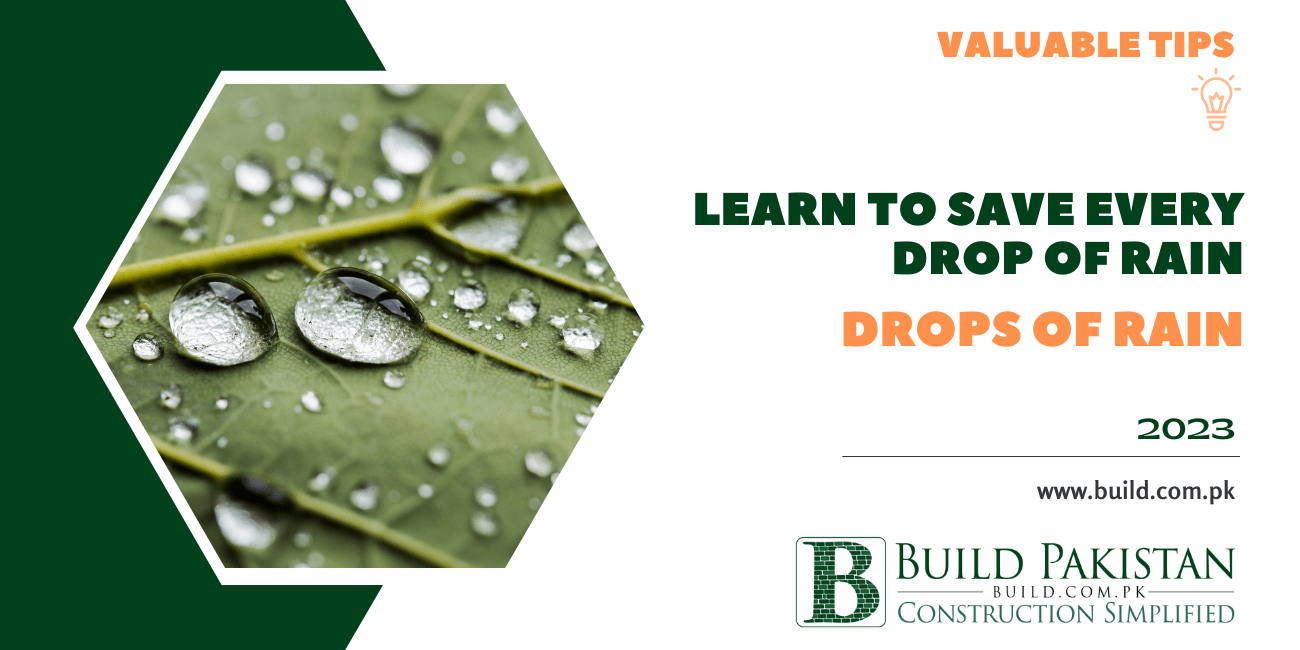Learn to save every drop of rain by following these simple steps

Learn to save every drop of rain by following these simple steps
One of the most important components that keeps life on Earth
alive is water. It is an incredibly valuable natural resource, therefore we
should utilise it properly and take every precaution to preserve it. Fresh
water supplies are becoming alarmingly limited as a result of the population
boom, which might lead to a worldwide water catastrophe.
Every year, especially in Pakistan's urban regions, vast amounts of fresh and pure rainwater are flushed down the toilet during the monsoon season since there is no effective way to preserve it. However, there are several ways for a household to conserve money and alleviate their water scarcity issues by collecting rainwater for later use.
Who knows how? We have your back!
To help you preserve and make the most of this priceless natural resource, we'll present and debate some of the greatest advice for rainwater conservation in this blog.
BEST ADVICE FOR CONSERVING RAINWATER
Here are a few simple methods for catching rainwater at home
for later usage around the house.
- Take Everything Outside and Give It a Quick Wash
- Direct Flow of Rainwater to Plants
- Create a Roof Garden and collect the rainwater in jugs for later use.
GET EVERYTHING NECESSARY OUTSIDE FOR A QUICK WASH
So when it starts to rain, the first thing you should do is
search for anything that needs to be cleaned. You may take them outside and
quickly wash them in the rain on your balcony or in your backyard. Your
automobile may also benefit from it. Once it stops raining, make careful to
clean the car's surface to prevent water and dirt droplets from leaving their
traces.
Pro Tip: For the greatest cleaning results, you may additionally coat the goods with some sort of soapy combination before rinsing them with rainwater and then wiping them dry with a piece of cloth.
RAINFALL THAT FLOWS DIRECTLY TO PLANTS
To irrigate plants using rainfall, you can attach a hose to
your roof's drainpipe. If your home is equipped with rain gutters, you may
utilise them to begin watering your plants in the rainy season. When it rains,
all you need to do is position your plant pots close to the downspouts that are
set up at various locations along your gutter system.
Establish a roof garden.
When it rains, rainwater typically collects in considerable
amounts on the roof, increasing the possibility of flooding inside the home.
You might build a garden on your roof to solve this issue and maximise the
usage of rainwater.
You may plant a variety of seeds and saplings that can soak
up a lot of water to create your roof garden. They don't even need to be
frequently watered because of their deep roots, which can store enough of water
for days.
One of the best ways to save rainwater at home is to plant a
garden on your roof. This practise also creates an insulating layer that may
help you avoid experiencing severe temperatures inside. If you're unsure of how
to create a rooftop garden in Pakistan, read this blog to obtain all the
information you need.
Please read The Idea of Green Roofing and Its Amazing Benefits.
RETAIN RAINWATER IN BINS OF VARIOUS SHAPES AND SIZE
Use different-sized basins, buckets, or drums to collect
rainwater within your house. Once you're done watering the plants, you may use
the hose you have connected to the drainpipe to collect rainwater in big
barrels.
Additionally, note any sharp or ragged edges on your home's roof where the majority of the rainfall often falls. To gather as much water as you can, you can set tiny containers there like a bowl or a bucket. One of the best methods to save rainwater at home is by doing this.
How to maintain the rainwater you have stored's quality
You should think about the cleanliness and hygienic
conditions of the water storage container you are utilising in addition to
practising rainwater conservation strategies. Here are some of the most crucial
points to remember in order to preserve the quality of your rainwater
collection.
Ensure that the downspouts and drainpipes of your home's gutter system are well cleaned. If you don't want rust, algae, or other contaminants to pollute the rainfall passing through them, they should be cleaned and maintained on a regular basis. Additionally, it would prevent the gutter pipes from clogging.
To keep the rainwater free of any form of waste, including
dirt and dead leaves, you should use some kind of filtering system when
collecting it.
Any containers you use to store rainwater, whether they be
bowls or drums, should be spotlessly clean. Water gathered in an unclean or
filthy container might quickly become polluted and useless. Additionally, watch
cautious for drinking any water that has been gathered without first purifying
it. Drinking contaminated water may cause major health issues.









